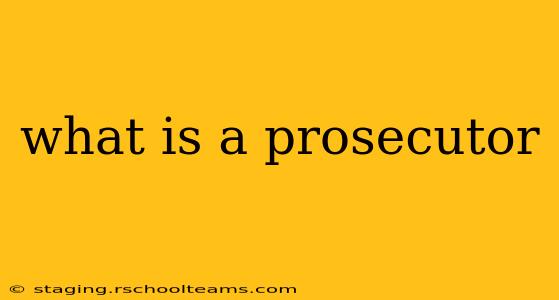A prosecutor is a legal representative of the government who initiates and conducts legal proceedings against individuals accused of committing crimes. Their role is crucial within the criminal justice system, acting as a gatekeeper, investigator, and advocate for the public interest. Understanding their responsibilities is key to comprehending how our legal system functions.
The Key Responsibilities of a Prosecutor
Prosecutors shoulder significant responsibilities, demanding a high level of legal expertise and ethical conduct. Their primary duties include:
1. Investigating Crimes and Gathering Evidence:
Before any charges are filed, prosecutors and their teams meticulously investigate alleged crimes. This involves:
- Reviewing police reports: Assessing the initial investigation conducted by law enforcement agencies.
- Interviewing witnesses: Gathering firsthand accounts and corroborating evidence.
- Analyzing forensic evidence: Interpreting scientific findings like DNA, fingerprints, or ballistics reports.
- Determining the strength of the case: Evaluating the sufficiency of evidence to proceed with prosecution.
2. Filing Charges and Presenting Cases in Court:
Once an investigation concludes, prosecutors decide whether to file criminal charges. This involves:
- Choosing the appropriate charges: Selecting the specific crimes that best reflect the evidence and the defendant's actions.
- Drafting indictments or informations: Formally accusing the defendant of committing specified offenses.
- Presenting the case in court: Presenting evidence, examining witnesses, and arguing for conviction. This includes opening statements, closing arguments, and responding to defense strategies.
3. Negotiating Plea Bargains:
Many criminal cases are resolved through plea bargains, where the defendant pleads guilty to a lesser charge in exchange for a reduced sentence. Prosecutors play a critical role in these negotiations, balancing the interests of justice with the practical realities of caseload management and resource limitations.
4. Ensuring Fair and Impartial Justice:
While advocating for convictions, prosecutors also have an ethical obligation to ensure fairness and due process. This involves:
- Disclosing exculpatory evidence: Sharing any evidence that could help the defense, even if it harms the prosecution's case.
- Respecting the defendant's rights: Upholding the defendant's constitutional rights throughout the legal process.
- Maintaining professional ethics: Adhering to strict rules of conduct and avoiding conflicts of interest.
Different Types of Prosecutors
The title and responsibilities of prosecutors can vary depending on the level of government:
- Federal Prosecutors: Employed by the Department of Justice, they prosecute federal crimes.
- State Prosecutors: Employed by state governments, they prosecute state crimes.
- Local Prosecutors: Often called District Attorneys (DAs) or County Attorneys, they prosecute crimes within their specific jurisdiction.
The Importance of Prosecutorial Discretion
Prosecutors wield significant power, possessing the discretion to decide which cases to pursue, what charges to file, and how aggressively to prosecute. This power necessitates careful consideration and a commitment to upholding the principles of justice. The exercise of this discretion is a key element of the criminal justice system's effectiveness and fairness.
Conclusion
The role of a prosecutor is multifaceted and demanding, requiring a unique blend of legal expertise, investigative skills, and ethical judgment. They are central to the functioning of the criminal justice system, balancing the need for public safety with the fundamental rights of the accused. A thorough understanding of their responsibilities is critical to a well-informed citizenry and a just society.
